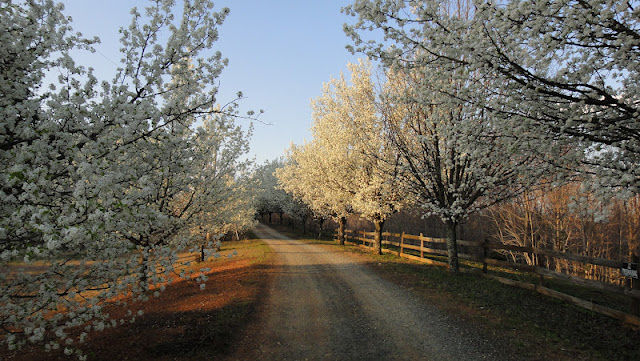For the past five years, I've read 42 books a year on average. My selections are deliberately diverse: I read everything from 19th century British literature, to the American travel memoir, to biographies, histories, and wilderness philosophies. Among my many literary passions is the book on writing as craft.
Because the book I am writing (which I'm still editing) includes plenty of natural description, I bought John A. Murray's
Writing about Nature, if just to pick up a few last minute tips. The book doesn't deal with nature writing as much as I had hoped, but it is full of useful quotes and tips about writing in general.
Here are some of the passages I underlined:
- “The important thing, it seems to me, is not whether you
keep journals, but, rather, whether you have regular mechanisms—extended
letters, telephone calls to close friends, visits with confidantes, daily
meditation, free-writing exercises—that enable you to comprehensively process events
as they occur.”
- “Toward the end of his life, Twain relied more and more on
a secretary, to whom he dictated his writings in the conviction that this
produced more of the natural, conversational flow. Twain believed that
preserving the spontaneity of the spoken word was paramount, in part because
the origins of written literature were in oral narrative. He realized that any
piece of prose that could be spoken effectively would read felicitously on the
page.”
- Quote from author, Gabriel Garcia Marquez: “One of the most difficult things
is the first paragraph. I have spent many months on a first paragraph and once
I get it, the rest just comes out very easily. In the first paragraph you solve
most of the problems with your book. The theme is defined, the style, the tone.
At least in my case, the first paragraph is a kind of sample of what the rest
of the book is going to be.”
- “Above all, look for texture, color, lines, shadowing and
movement in the same discerning way that an artist does. Search for those
important details that make the scene singular. At the same time look for
images that will make the scene familiar to your readers, both in the present
time and in the future time (always remember to write for the future audience,
for the person reading your book not tomorrow but a century from tomorrow).”
- “What many of us have discovered out there—as Peter Matthiessen
did in the Himalayas, for example—is that you cannot escape human nature. The
two are inextricably intertwined, and what our readers most hunger for are the
connections between the two, the intersections which are revealed most clearly
through dialogue and character.”
- “Metaphors are always more powerful than similes.” Metaphor: 'The full moon rose, a cream poppy over the fields.' Simile: 'The moon rose like a cream poppy over the fields.'
From my own experiences reading and writing about nature, I would add this: Keep it simple. It's difficult for the human mind to form images of elaborately-described physical landscapes. Tell the reader the basics: that there are mountains and a valley and a river, but let the reader fill in most of the details on his or her own. Don't worry about details; worry about tone. If your tone is inspired, your reader will automatically imagine an inspired landscape. If your tone is gloomy, they will imagine something gloomy.
Once we begin using complex geologic or geographic terms (precipice, escarpment, permafrost) and begin to name specific species of plants and specific types of rock (which the reader will most likely know nothing about and will therefore not be able to visualize), the reader will get confused and frustrated and bored. And I'd also say: be bold. The reader does not have the attention span for boring reverential, flowery descriptions. The metaphors should be juicy and fresh and grand.
Some more general writing tips from Murray:
1. Assume that the reader can draw his or her own
conclusions.
2. At some point in composition, develop an outline or plan.
3. Write in whatever form you are comfortable.
4. Aim for concision and clarity.
5. Use words precisely.
6. Remember that the last word of a sentence, paragraph, or
essay occupies a naturally emphatic position, and that what you write here will
long echo in the reader’s mind.
7. Put actions into verbs and actors into the subjects.
8. Avoid too many modifiers and avoid intensifiers.
9. Write for the ages.
10. Describe people and places and things when they first
appear in the text, or shorty after.
11. Use figurative language judiciously.
12. Vary your sentence patterns.
13. Put aside your essay for a few days before finishing
it.
14. Whichever style you choose, master it.
15. Read the best literary examples you can.
16. Write from experience.
17. Do not share your work too soon with others.
18. Establish a deadline as early as you can and keep to it.
19. All grammatical and composition rules can and should be
broken where circumstances dictate.
20. Watch your transitions carefully, for it is there that
a piece can most easily lose its connectivity.
21. Defend the artistic integrity of your work as you would
the life or reputation of your child.
22. Humble yourself before the text; put what is best for
it above what you may personally care for in it.
Other wonderful books on writing: Anne Lamott's
Bird by Bird, Natalie Goldberg's
Writing down the Bones; Annie Dillard's
On Writing; and the granddaddy of all writing books, Robert McKee's
Story.
If you have any nature writing tips, or writing tips in general, feel free to share in the comment section!













































